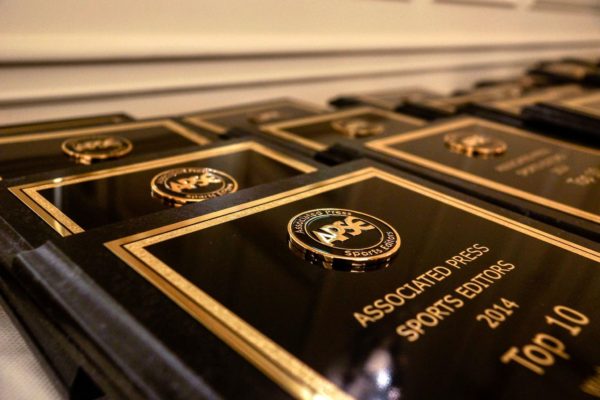Webcasts, power rankings and American flag singlets, that’s how Northwest Herald sports editor Eric Olson rolls.
Olson isn’t afraid to do a stunt to get a laugh or some hits on his paper’s outstanding prep sports website, McHenryCountySports.com. That’s why he still gets comments about the American flag singlet he donned while losing a wrestling match to Crystal Lake Central wrestler Trevor Parlberg in his Summer Prep Challenge video series from 2008.
That video rolled in the background as Olson talked about making prep sports coverage fun not only for himself but, more importantly, for readers during his presentation with Chicago Tribune High School Sports Editor Paul Skrbina last month at the APSE Great Lakes Region meeting at Tribune Tower in Chicago.
"I had no idea I was going to see Eric in a singlet today," Skrbina said.
The pair talked about engaging readers and high school athletes in creative ways.
Skrbina implemented a live, 12-page high school football tab section that netted his company plenty of advertising dollars during his time at the Sauk Valley Newspapers (Sterling, Ill.) and also dressed one prep football star in a Superman costume and put him in a phone booth for a prep football preview cover. At the Chicago Tribune, Skrbina helped reporter Colleen Kane in her series that took readers inside the off-the-court lives of the state-champion Bolingbrook High School girls basketball team with video, blogs and in print.
Olson’s team has put together sponsored webcasts of both football and basketball games – with a ton of help from videographer Les Johnson – and also showcased McHenryCountySports.com mascot "The Rant," who spouts off about high school sports in everything from blog posts to Twitter and Facebook.
The end of the pairs’ prep sports discussion, however, got a lot more serious. Skrbina talked about how his team approached a story about a local high school athlete who was caught with steroids, while others joined in on a discussion about how to approach high school athletes and trouble with the law, drinking, Facebook and bad attitudes.
The group also discussed selecting all-area teams in a time when fewer staff writers are available to watch athletes compete and when off-the-court activities should be included in the discussion when selecting players for postseason honors.
There were plenty of differing opinions, but the overall sentiment seemed to be that each case is different and the newspaper should attempt to hash out the details of each case on its own merit before making decisions.
If an athlete misses a set number of games for a drinking party, that should probably be weighed differently than missing that same number of games for academics, an arrest or violating team rules by breaking a curfew, insubordination or showing up late for practice.
"Who am I to judge character?" Skrbina said.
His point was that, regardless how many times we interview an athlete, it’s still difficult to say we really know them or what they are really like away from the playing field.
When the inevitable phone calls come after writing a story about a young athlete’s indiscretions or an all-area team, our main journalistic tenets should remain the same.
"Is it wrong?" is the first question Skrbina recommended asking. “Did we get the facts wrong?”





